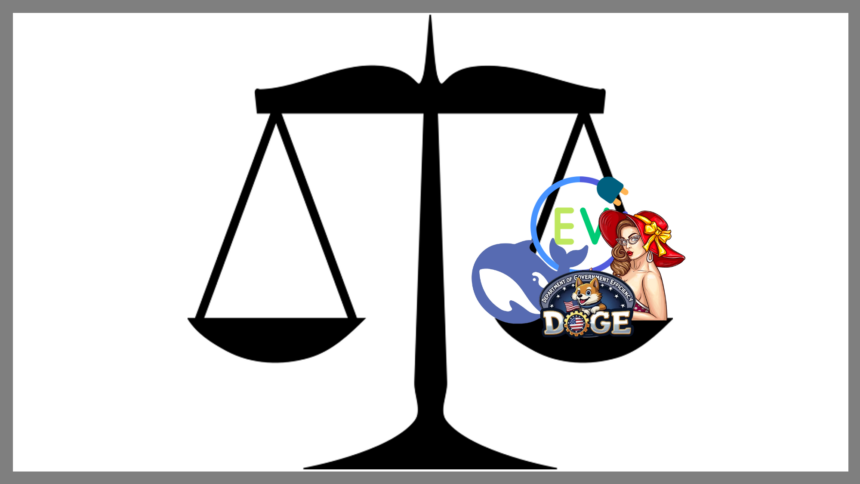Technology moves fast — touching everything — remaking the face of our world. The intersection of technology and law is more contentious than ever, from government lawsuits against tech companies to privacy battles and regulatory crackdowns. Legal fights erupted over data access, national security risks, online marketplace accountability, and electric vehicle infrastructure funding in the past week.
Major lawsuits challenging Elon Musk’s access to government systems, concerns over Chinese AI apps, and the halting of a $5 billion EV charging network highlight the growing friction between innovation and regulation.
What’s Happening & Why This Matters
State AGs Move to Block Musk’s DOGE Access to Government Data
A coalition of 14 state attorneys general is suing to prevent Elon Musk’s Department of Government Efficiency (DOGE) from accessing U.S. Treasury Department systems. The lawsuit, led by New York Attorney General Letitia James, claims DOGE’s actions violate federal privacy laws by allowing unauthorized individuals access to sensitive data.
- DOGE, created by executive order under President Trump, was designed to reduce government waste but has been criticized for privacy violations.
- Musk’s team, composed of staffers aged 19 to 24, reportedly accessed Social Security and bank account data without proper federal security clearance.
- Union groups representing federal employees have filed their lawsuit, arguing that such access compromises privacy protections under federal law.
- A federal judge has restricted DOGE’s access, limiting it to read-only mode for two authorized staffers.
- Musk has dismissed these concerns, accusing journalists of biased reporting and calling the investigation politically motivated.
U.S. Lawmakers Propose Ban on DeepSeek AI for Government Devices

DeepSeek, a Chinese AI-powered app, is the latest target of national security concerns in the U.S. Lawmakers have introduced a bill to ban DeepSeek on all government-issued devices, citing potential security threats linked to China Mobile, a state-owned telecom company.
- A cybersecurity report uncovered that DeepSeek allegedly transmits user login data to China Mobile, raising alarms over state-sponsored surveillance risks.
- Reps. Josh Gottheimer (D-N.J.) and Darin LaHood (R-Ill.) introduced the “No DeepSeek on Government Devices Act,” modeled after the previous TikTok ban.
- Due to security concerns, DeepSeek has already been banned on government devices in Texas, the U.S. Navy, and NASA.
- Several international governments, including Australia, South Korea, and Italy, have imposed similar restrictions on DeepSeek.
U.S. Halts $5 Billion EV Charging Network Amid Policy Shift

The Department of Transportation (DOT) has ordered all U.S. states to suspend work on the federally funded National Electric Vehicle Infrastructure (NEVI) program. The decision, issued by Trump-appointed Transportation Secretary Sean Duffy, represents a significant shift in federal EV policy.
- The directive cancels plans for new charging stations, even in states where construction had already begun.
- Tesla, which had secured $31 million in NEVI funding to expand its Supercharger network, now faces uncertainty regarding these projects.
- The DOT stated it would issue revised guidelines for EV infrastructure funding later in the year, leaving states and automakers in limbo.
- The DoT’s decision aligns with Trump’s stance against federal subsidies for electric vehicle adoption.
EU Court Rules Online Platforms Aren’t Liable for Sex Ad Content

The European Court of Justice (ECJ) has issued a non-binding opinion on online platform liability, ruling that marketplace websites are not legally responsible for third-party advertisements, including explicit content.
- The case originated in Romania, where a woman’s data was used in a sex ad without her consent.
- The ECJ ruled that platforms must verify advertisers’ identities but are not obligated to monitor or pre-screen content.
- Under GDPR, platforms must implement adequate security measures to protect user data, but systematic content moderation is not required.
- The ruling may influence future cases concerning online marketplace liability and data privacy protections.
TF Summary: What’s Next
The collision of technology and law is intensifying, with cases challenging government data access, AI-driven national security risks, EV infrastructure funding, and online platform accountability. As these legal battles unfold in courts and legislatures worldwide, they will shape how tech companies operate, how governments regulate, and how users’ privacy is protected. Expect more lawsuits, debates, and new policies that could redefine the future of digital governance.
— Text-to-Speech (TTS) provided by gspeech


